Using an automobile vehicle, a lot of things are put in consideration. Speed, engine performance, emission, life span, aesthetics, and comfort amongst other things.
One of the crucial desires a car owner expects from his vehicle is comfort. While taking a ride in your vehicle, you would definitely want it to be as comfortable as possible. Of what use is the speed or power delivery of the engine if the ride in it is uncomfortable. For me, I would choose a slow car that gives maximum comfort because I wouldn’t want to use pain killers every time I ride in the vehicle.
For a while now, I have talked about some stuff that are not directly related to the automobile but are relevant to the production of automobile parts and the likes. These processes are the ways that the automobile engine and parts came to be and cannot be eliminated. If you are wondering what I am talking about please check them out here and here.
Away from that, today we are back to the mechanic workshop!
Talking about comfort while driving, the system responsible for ensuring passenger comfort while driving is the suspension and that is what we will be discussing today with special reference to the shock absorber.
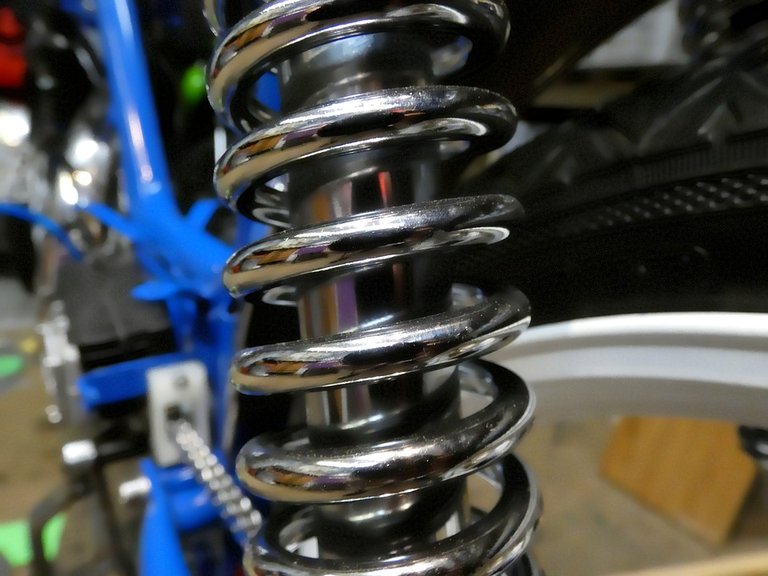
image source: pixabay under cc0 license
Hey you! You are under suspension
Contrary to the basic English meaning of the word suspension as a temporary loss of right to something for period of time, the suspension in the automobile holds more water
Lets assume you are cruising on a smooth road at a reasonable speed and you are enjoying the ride, then you encounter a big bump or pot hole and it is too late to do anything about it so, thud! You hit the bump but all you feel is a small bounce compared to the impact of the vehicle. Naturally, you would not be amazed, well why should you be? But have you tried to consider what made it possible for you not to feel the effect of that impact?
According to the third law of motion, encountering such a situation should have the whole vehicle bouncing off because the impact will give the tyre some vertical acceleration and have the vehicle literarily flying for some seconds before slamming back on the road but no, that didn’t happen all thanks to the suspension system.
Removing the body frame of the automobile, the engine and all its interiors, you will be left with the lower frame, the wheels with the shock absorbers hanging out, the steering system and a few other wires here and there just like in the picture beside. This is called the chassis and it comprises of all other components that are beneath the body of the automobile.
A few (or most) components out, and you are left with the suspension system which comprise of the tyre, springs, the dampers and anti-sway bars (looking for the shock absorber? Wait a while)
The suspension system is the system in the automobile that supports and connects the upper weight to the lower part.
The suspension system of the automobile is saddled with the function of ensuring the vehicle has a smooth ride and it can safely accelerate, brake and corner. It also functions to keep the tyres in contact with the road (i.e. preventing cars from flying anyhow)
Simply put, the suspension is the system in the automobile that ensures comfort.
The major components of the suspension include the Springs, the dampers and anti-sway bars.
Let’s take them one by one.
SPRINGS
Springs used in an automobile are usually of four distinct designs but they do the same job – they absorb energy and dissipate it accordingly. I wouldn’t be assuming if the first type of spring that comes to your mind is the coil spring, well there are three others. These springs however do the same job and are used depending on the type of vehicle. Let’s take a look at the types of springs a suspension system uses.
- THE COIL SPRINGS
These type of springs are the most common in the automobiles of today. I am sure it is the type of spring you were thinking about. Well, the coil spring is simply “a heavy duty torsion bar wrapped around an axis”. The coil spring absorbs the energy from the motion of the wheels by compressing and expanding.
- LEAF SPRINGS which is simply metal bars bound together in layers such that they act together but they have the function of any spring and as a matter of fact, they were the first types of spring used in a suspension going as far back as the time when horse drawn carriages were in use and they still find application in the heavy duty trucks of today.
- TORSION SPRINGS
The torsion springs are more of like the coil springs stretched out and as required, they also perform the same function as a coil spring but in this case, it is attached to the vehicle frame at one end and the wishbone at the other end. The torsion springs absorb the energy of the movement of the wheels through torsion in the material.
- AIR SPRINGS
As the name implies, these are springs that are made of a chamber filled with air. The air springs act on the advantage of the compressive properties of air to absorb the energy from the tyre. The air springs have also been around for a while dating as far back as the 1930’s where the use of leather diaphragms and air springs made of molded rubber were used.
WHAT DOES THE SPRING REALLY DO.
In order to explain how the springs in a suspension system works, we would need to do a little physics. (who is excited?)
Lets first do an experiment.
Get yourself a small coil spring (I believe that shouldn’t be hard to get), place it on a flat surface and compress it with your hand. As expected, the spring will “jump” when you release your hand and depending on the type of spring, the jump might be very high. The reason for this jump is that the spring stored the energy you exerted by compressing it and then when you released it, the energy was dissipated (simple right?). this energy dissipation is in the form of oscillation (to and fro movement). The force of a spring is described by Hooke’s law and is given by this equation.
Where F is the force produced by the spring, K is a constant known as the spring rate and x is the distance at which it was compressed.
So basically, the springs perform the function of storing and dissipation the energy derived when the tyres encounter a bump or obstruction on the road
I would also like to say a few things about how the weight in an automobile is distributed. The weight of the vehicle with respect to the springs is divided into two namely; the sprung and the unsprung weight. The sprung weight is the mass of the upper part of the vehicle on the spring while the unsprung weight is the opposite i.e. the parts that are between the spring and the road. The spring however affects the sprung weight as that is the part that would feel the effect of its oscillation.
One property of springs that is not so favorable to the vehicles is that they do not dissipate the energy all at once i.e. if you find a way to hold the spring in my example down to the surface, after releasing it, it would oscillate several times before finally coming to rest. If this is installed in a vehicle alone, it would only result in a more bumpy ride as the spring will be happy to dissipate the energy it stored (at an uncontrollable rate) and the occupants of a vehicle would be seen dangling up and down in the vehicle several meters after they encountered the bump or pot hole.
How then do we solve this issue of dangling?
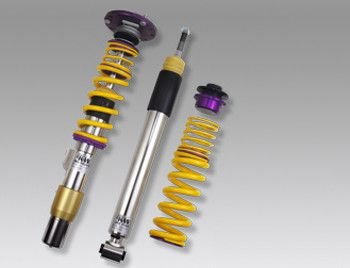
image source: wikimedia commons under the Creative Commons Attribution-Share Alike 4.0 International license.
THE DAMPERS
In order to control the rate at which the springs dissipate the energy they initially absorb, the dampers are installed alongside the springs. And yes, that’s where the name shock absorber comes to play. It is quite self-explanatory, the dampeners absorb the shock!
If the springs are not dampened, the ride cannot be smooth as required and the bouncing would simply occur at an uncontrollable rate.
A simple definition of a damper is a device that prevents free motion. The type of damper employed in a suspension system is the dashpot type which is a damper that performs the motion-resistance function via viscous motion i.e. motion in a fluid.
The shock absorber is also known as the “snubber” or simply “shocks” and is usually of two types – the hydraulic and the pneumatic types. However, the hydraulic type will be used to describe the shock absorber. Basically, the shock absorber converts the kinetic energy gotten as a result of the movement of the suspension (the spring in action) into heat. The shock absorber simply prevents the sprung weight from bouncing as a result of the spring action while keeping the unsprung weight on the ground
The hydraulic shock absorber comes in the form of an oil pump which contains a piston in a tube that contains viscous fluid such as oil. The piston is connected directly to the upper mount of the device which is connected to the vehicle frame (sprung weight) while the lower mount is attached to the axle (unsprung weight).
The shock absorbers come in two distinct designs – the mono and the twin tube designs. As the names imply, the difference is basically the number of tubes in the shock absorber. The mono tube design has just one single tube with two pistons. One is the working piston and the other is the “dividing” piston which simply functions to prevent the gas content of the device from flowing into the liquid chamber. While the twin tube is made of two tubes (one inside the other) to eliminate the need for a longer chamber to accommodate the fluids. The twin tube type is shorter than the mono tube but cannot be installed either way like the mono tube type can.
How then does the absorber perform its function
Recall that when a bump or obstruction is encountered by the tyre, the spring compresses and absorbs the energy, when it uncoils, the energy is transferred to the shock absorber. The piston moves downward in what is called the COMPRESSION CYCLE. the downward movement of the piston compresses the fluid and causes the fluid to be forced through small orifices in the piston. Because these orifices are very small, the rate at which the fluid flows through is very small and thus, the spring does not oscillate rapidly as it would if it was alone therefore slowing down the spring action. As the spring expand, the EXTENSION CYCLE of the shock absorber is live. The piston moves upwards and compresses the fluid there and in the same vein, slowing down the spring motion.
This operation of the shock absorber results in the conversion of the kinetic energy into heat energy which is eventually dissipated to the atmosphere.
In some vehicles, the spring and the shock absorber are installed separately while in some others, the spring and damper are one unit. When the two (spring and damper) are one unit, it is known as a strut. The strut performs the same function as the shock absorber and even more – it provides support for the suspension but either ways, any of the type of spring and damper devices fitted are sure to do the job.
NO, I DIDN’T FORGET THE SWAY BARS
The third but not the least part of the suspension is the anti-sway bars. As the name implies, these bars function to prevent the vehicle from swaying i.e. to ensure stability. The anti-sway bars usually run from one wheel to the other on each axle and they help to ensure even “up and down” movement of the two sides of the vehicle.
Take for instance the right side of a vehicle hits a bump and the suspension on that side absorbs the shock. The anti-sway bar ensures the left side does not sway to the side in response to that effect therefore causing additional stability.
A FEW POINTS TO NOTE
- When there is an issue with the suspension (most times, the shock absorber) the symptoms such as; vibrations, swerving, nose dives when braking, rocking or rattling sound, uneven wear of the tyre, longer stopping distance and a few others.
- If you notice any of these symptoms, do not hesitate to take the vehicle to a trusted and experienced automobile engineer to get it fixed.
- If a shock absorber is faulty, one of the physical signs is a leak from the casing which would require a change. In the case of changing the shock absorber, the two sides are always recommended to be changed to ensure even performance (a new shock absorber will perform better than an old one)
- changing the shock absorber in a strut does not necessarily require changing the coil spring as the coil springs can be re-used.
CONCLUSION
The suspension is one very important system of the automobile and although it is “out of sight” it is definitely not “out of mind”.
The suspension system help to prevent the occupants of the vehicle from feeling the direct effect of the shocks encountered by the lower part of the vehicle and also enhances the vehicle’s mobility. Apart from absorbing effects of vibration when an obstacle is encountered, it also cushions the effect of braking, accelerating and steering.
Learn once in a while to say thank you to the suspension for “taking the bullet” for you.
Your feedback on my posts are amazing and I look forward to seeing more. A big thank you to the #steemstem family for making science writing fun!
REFERENCES
1. How car suspensions work
2. Shock absorber
3. Shock absorbers explained
4. Suspension
5. Automotive engineering fundamentals (textbook) by Richard stone and Jeffery K. Ball
If you write STEM (Science, Technology, Engineering, and Mathematics) related posts, consider joining #steemSTEM on steemit chat or discord here. If you are from Nigeria, you may want to include the #stemng tag in your post. You can visit this blog by @stemng for more details.


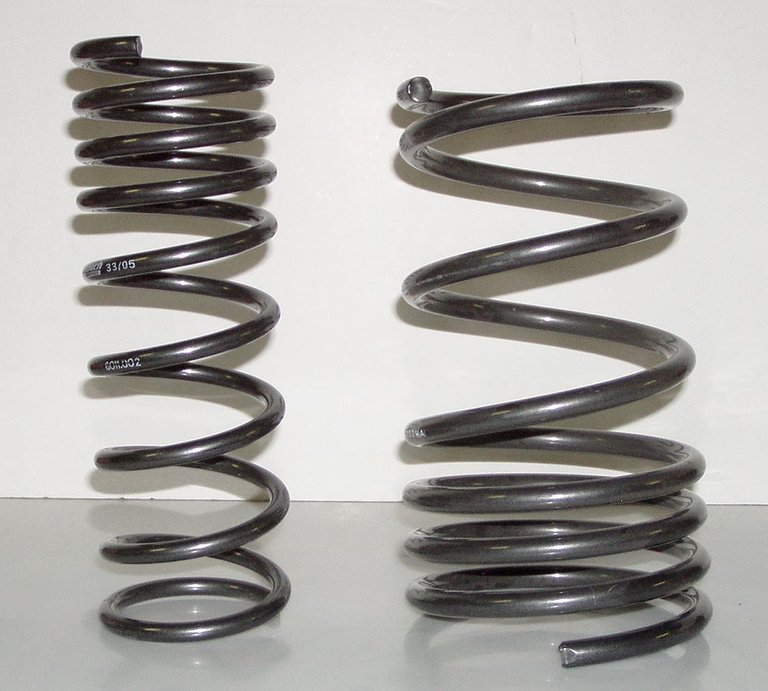
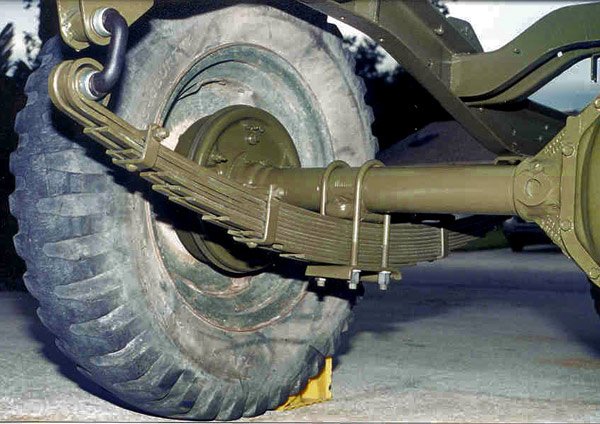
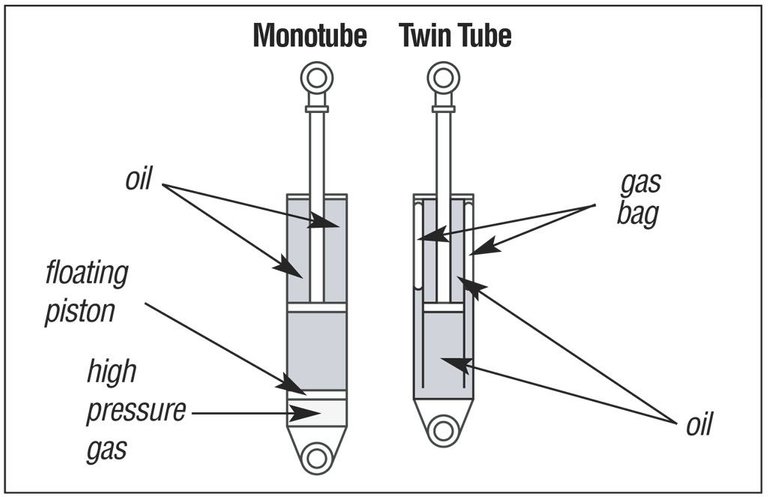
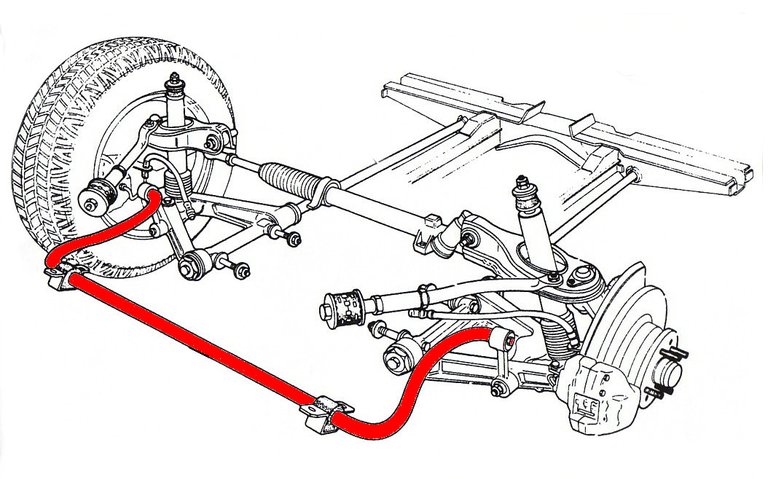
Surely I knew Newton's Laws of Motion but i haven't considered it's application in car manufacturing, thanks for the knowledge man
you are welcome.
Great posting bro, automotives really are a feat of engineering. Keep it up
Very informative. Really I'm not yet a vehicle owner but on reading this post, i won't have issues when I have my car. I've somewhat had the first hand knowledge on schematics behind suspension and shock absorbers. Thanks baba @rharphelle. Please go ahead and inform us about Car brakes too, maybe In your next post.
well, i have written about the anti-lock break systm before and i talked about the brake to some extent there. i would consider writing about it.
thanks for dropping by
The automobile suspension is really a vital part of the automobile. Speaking of comfort while driving, this system provides you with that.
So much of application of mechanics here. The springs give the cushion effect, while you enter region with pot holes or bad terrains. The spring however will want to continue to oscilate due to its eleastic nature. Then shock absorber comes in here. It takes up this energy from the spring and dissipate it by virtue of a fluid.
Great work sir!
thank you for your input.. much appreciated
My pleasure sir.
The first time i saw these shock absorbers i was wondering what these metals with springs were till i came across them one day in the vehicles. That was when i first knew what shock absorbers were.
Their importance is felt in the vehicle especially in gallops. Thanks for the education.
Well, Oyinbo say education is the realisation of verification taink you
Lol
Shock Absorber 😂😂 I hear it a lot. Those quack engineers mention it a lot.
The dampers really need be installed otherwise, "I am not there" o
What mechanism is employed in those American cars that bounces. It's spring right?
Hydraulics I guess.
yes ..the car owners install hydraulic lift kits that are conrollable by the operator. you can read here
Oh. That's for the prompt reply. I sure will read about it.
😂😂😂I can relate... I have similar experiences.
Makes the two of us..It's actually popular
👍
Even without having car yet I now know almost everything about my future car. You are really giving us back to back amazing automobile posts.
Thanks for teaching me about suspension system.
maybe its a sign that your car is on the way
I claim it oh.
Good to know certain functions of suspensions in a vehicle..I've always wondered what the metal jargons called leaf spring type in some vehicles works for...Thanks for sharing
thank you for reading through
Wawu... So the suspension does everything from ensuring the wheels to stay connected with the road, for better grip and braking plus stop the car from shaking to pieces over rough surfaces. As well as smoothing a bumpy ride...
There's nothing I won't learn from steemSTEM oh, even the shock absorber, I only hear people say it.
With @rharphelle's blog, I won't have any problem with my car when I get one😁
lol i am flattered.
thank you
Welcome sir.
Nice post. When I went to a Mechanic Workshop to spend one of my holidays, the next thing I learnt after brakes is the shock absorber and the way it's fitted into the coil spring. The spring is a very important part of the shock absorber has the shock absorber is important to a car. If not for the shock absorbers in cars maybe most people would have died of shock due to bad roads.
Nice Post, I love it.
yes the two components complement one another. thanks for being here
The comprehensiveness of this post is beyond my understanding. I don’t have a lot to contribute but I’ll say, justice has been done here
haha @kingabesh the king!
thank you for stopping by, i am treading in your footsteps
This post makes me remember my dad's abandoned car I take around, the shock absorber and the spring are wack already and need replacement but I never knew on time that that's what caused body ache after driving the car, until I lay hold my hands on a better car then I knew something was wrong, shock absorber and spring are really important.
Leant more about them through this. Very much educative. Nice one boss.
i can only imagine the feeling of "bumpiness" when you drive that car. The suspension really does a lot and some of us do not know about it.
thank you for reading
After watching this video of Bose's electromagnetic suspension, I was now better informed on vehicle's ability to withstand a bumpy road is courtesy of suspension.
https://m.youtube.com/watch?v=3KPYIaks1UY
sincerely, my first time seeing this type of suspension and damn! it so sleek.
pity it is not economical for mass production.
thank you for dropping by!
The springs serve as the shock absorber right? I'm thinking of something: what if I replace the normal springs with some monster springs, will I produce an ATV (All terrain Vehicle)?.
Nice piece man
You mixed it up bro, the spring and the shock absorber are two different components. The shock absorber dampens the spring effect.
When the spring and shock absorber are one unit, it is called the strut.
If you want an ATV, please buy one. 😁
Lol. Okay I now get it. Thanks man.
P.S: I wan cut cost naa. No be to convert small car enter ATV naa? Replace d tires with large tires. Lol, na die be dat oo
lol. kuku put trailer tyre ontop camry... your ATV don land be that!
Confam. U dey think wetin I dey think :D
For you to write this kind of post you must be a mechanical engineering guy!😅😅. Wow I almost know everything about vehicle suspensions. Kudos man
Ofcourse I am. Some people call me the steemit mechanic.
Thanks for dropping by
You appreciate a thing more when you lose it. If you have ever been in a car without a functional suspension systems (especially on some Nigerian roads) then you'll know the importance of this "unseen" hardworking auto part. Another beautiful post. Weldone sir